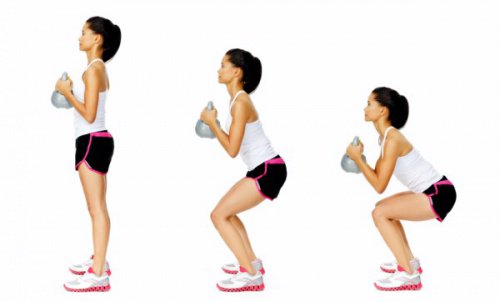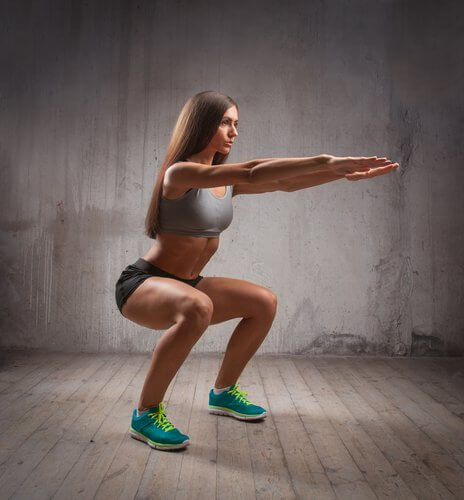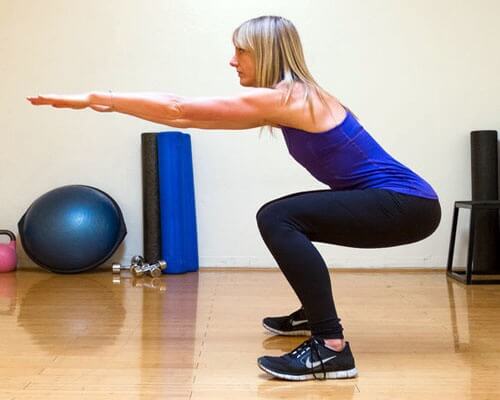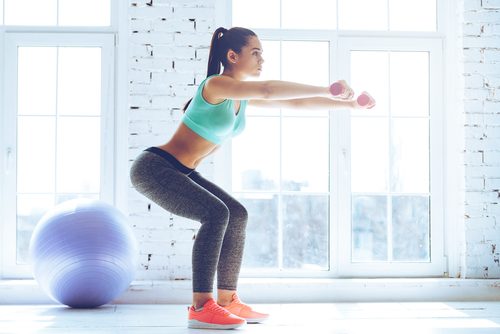How to Do Squats Correctly: 4 Recommendations


Reviewed and approved by Doctor Carlos Fabián Avila
To do squats correctly takes practice. Exercising is very important in today’s world.
Every day, there are more people who sign up to do some kind of exercise, whether it be to look good or for their health.
Among the different activities, squats stand out. Here’s how to do squats correctly:
What are squats?
It doesn’t matter if the exercise is conventional or is based on new styles. Squats have always have been and will always be popular when it comes to tone your body!
This is an exercise that focuses on the lower parts of your body.
- Muscles
- Tendons
- Ligaments
Squats not only contribute to the development of your strength. They also tone, promote muscle growth and help improve your physical capacities.
Squats work the area around your glutes, thighs, and legs.
There are different kinds of squats. However, each one depends on the area that you want to strengthen. Because of this, there isn’t a single model.
Despite this, many people still do them incorrectly. A bad form when doing squats brings with it many negative repercussions.
One of the most common and relevant ones is an injury. While each part of your legs can get injured, your knees are the most affected by a bad form.
Read also: The Best Exercises to Stretch Your Muscles
How to do squats correctly

Because of this, it’s worth mentioning a series of recommendations for improving your squat technique. At the same time, you can avoid injuries and get better results.
1. Distribute your weight
When doing squats, your weight tends to shift to the balls of your feet (the area known as the metatarsal).
When this happens, you may risk an injury. On the other hand, this makes your back lose stability and tend to move forward.
- Our first recommendation is to distribute your weight. Try to put most of it on your heels. This way, your back keeps its straight posture.
- This usually results in having a strengthened core (lumbar, obliques, abdomen). This makes it easier to distribute your weight.
2. Maintain your posture
One of the most common errors with respect to this exercise is the loss of your posture. This is determining for getting the desired results.
- Your back should be straight and aligned with the rest of your body.
- Then, your gaze should be towards the front (this way you can force your head to go to the same area).
- Your shoulders should be back. This is because this helps your breathing and prevents injuries.
Following this train of thought, it’s recommended to keep this position while you do squats (both going up and coming down).
Also, your back should never curve or bend.
3. Start with a good posture
Even though there are several types of squats, the position you start them in is usually the same.
The problem here is, once again, bad posture.
People do this activity with the goal of getting bigger glutes and hamstrings. However, despite not being a bad goal, many are going much farther.
There are many who start with bad posture and hurt their body in general.
To start a set of squats properly, it’s necessary to assume a good position for your body. Your legs should be separated at shoulder width apart.
It’s also necessary to remember that the best initial position depends on each person. You need to establish this before starting your session.
4. Lowering as much as possible
The idea when doing a squat is to go down as much as you can. Doing this, you flex your legs and stick out your glutes.
However, many people drop the proper posture when they try to go lower. This can cause certain problems.
Yes, lowering more works your muscles, tendons, and other related parts in this area more. However, you need to keep in mind your own abilities.
You can’t ignore the diameter of your bones. This is especially true of the femur, tibia, and the fibula. You also can’t ignore your muscle capacity.
From there, you can establish how low you can go.
Did you enjoy this article on how to do squats correctly?
All cited sources were thoroughly reviewed by our team to ensure their quality, reliability, currency, and validity. The bibliography of this article was considered reliable and of academic or scientific accuracy.
- Fernández, A., & Federación Española de Actividades Dirigidas y Fitness. (n.d.). Sentadilla profunda: Ejercicio clave para mejor forma y función del tren inferior. Retrieved January 16, 2019, from http://www.fedamadrid.com/sentadilla-profunda-ejercicio-clave-para-mejor-forma-y-funcion-del-tren-inferior/
- Fry, A. C., Smith, J. C., & Schilling, B. K. (2003). Effect of knee position on hip and knee torques during the barbell squat. Journal of strength and conditioning research, 17(4), 629–633. https://pubmed.ncbi.nlm.nih.gov/14636100/
- Strengthening your core: Right and wrong ways to do lunges, squats, and planks. 2011. Harvard Health Publishing. https://www.health.harvard.edu/blog/strengthening-your-core-right-and-wrong-ways-to-do-lunges-squats-and-planks-201106292810
This text is provided for informational purposes only and does not replace consultation with a professional. If in doubt, consult your specialist.








